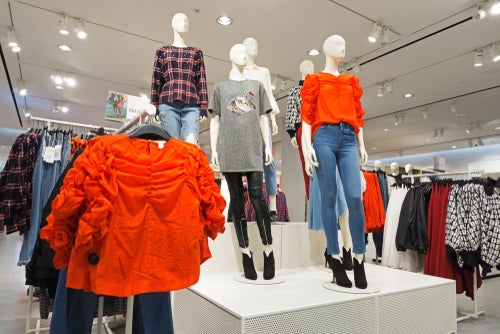
The investigation into the H&M Group’s environmental scorecards, which was carried out by online news publication, Quartz, follows on from the Sustainable Apparel Coalition (SAC) pausing its consumer-facing transparency programme.
The programme, which includes H&M as a member and features data from the HIGG MSI tool, has come to a halt due to Norway’s advertising watchdog suggesting there has been misleading environmental claims from brands.
Quartz claims that over half of the scorecards on H&M’s website listed clothing as being better for the environment than they were in reality and suggests the items were no more sustainable than comparable garments made by the company and its competitors. In fact, Quartz goes as far as to say ‘in the most egregious cases, H&M showed data that were the exact opposite of reality’.
The H&M spokesperson defends its aim to give customers transparency when it comes to shopping for fast fashion items by stating: “We would like to underline that the customer facing transparency programme does not indicate that a product has lower environmental impact compared to those without the HIGG index.”
She continues: “Our intention is to disclose available transparent information of the product and its’ impact, regardless of its score, whether its baseline, level 1, 2 or 3. We share information on individual product no matter if the score is good or bad. We do this because we believe that transparency is key to driving sustainable change across the industry as it creates both comparability and accountability and this will ultimately lead to positive change.”
Global Data apparel analyst Emily Salter tells Just Style exclusively that H&M has built its reputation on being a more sustainable retailer and was the first fast fashion player to launch a more sustainable product collection.

US Tariffs are shifting - will you react or anticipate?
Don’t let policy changes catch you off guard. Stay proactive with real-time data and expert analysis.
By GlobalDataHowever, she is quick to argue that along with other fast fashion players, is increasingly being criticised for greenwashing, with it still producing a vast amount of clothing and this is negating any potential positive impacts of its Conscious Collection and other initiatives.
Salter says: “This investigation may increase consumer scrutiny of retailers’ sustainability claims, and illustrates the need for greater regulation and standards around the claims that retailers can make regarding the sustainability of their products.”
The H&M spokesperson explains that given the circumstances of SAC’s programme currently being on hold, H&M has taken the decision to take down the scorecards in all of its markets’ online shops where it has currently been available.
“This is a gradual process that takes some days. During the process of removing the Higg Index from our websites, we came across a couple of irregularities which go back to technical issues and human error. We are looking into this further.”
She also points out the H&M Group has been a SAC member for many years, and believes in the Higg Index’s value to provide an industry-wide method for standardising and verifying third-party information on sustainability performance.
She says: “It has been developed by the industry together with a large group of stakeholders. We know the SAC has acknowledged receipt of the report from the Norwegian Consumer Authority and are taking it very seriously. They are currently reviewing the findings in detail. Once this analysis is complete, the SAC will be providing further comment.”
The spokesperson is also keen to support MSI, which is the method behind the Higg transparency layer that is used by the SAC programme.
“It is the most developed industry-wide method available at scale today. We see this as a starting point for the industry – not the end destination.”
She highlights that H&M would like to see primary data being used and the company is encouraging its suppliers to gather and share their primary data that is necessary to fill the gaps.
“But the industry is not there yet. In order to create progress, the industry needs to start taking collective action now.”



